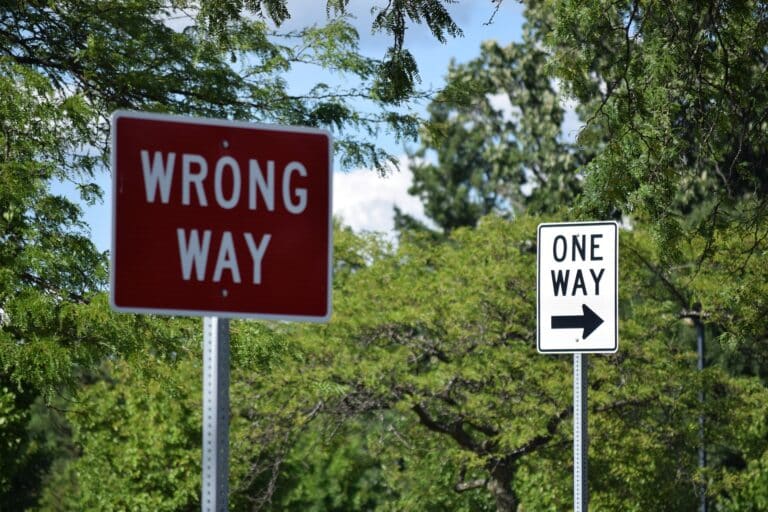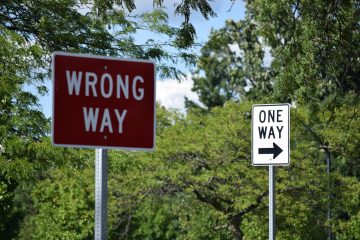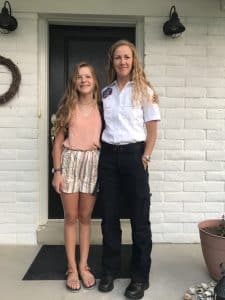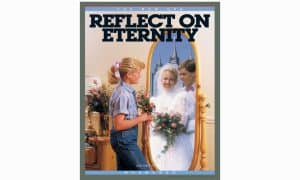by Alison
Sometimes it feels like there are two groups of women within the church. Those who feel as if they were taught to be nothing else but a wife and mother and those who insist that was never taught. The latter insists that what the former experienced must have been a regional thing or perhaps the leaders were only speaking from their own experiences. They say they never felt the pressure to postpone or abandon a career in order to stay home with children.
Anyone who attended Young Women between 1994 and 2012 was taught the importance of being a wife and mother as a teenager (or at the very least, that is what the church wanted them to be taught). During these years, the church rotated through three manuals that contained lessons specifically for the girls aged 12-18 in the Young Women’s program.* The boys had a different set of manuals. If you attended a Young Women’s class between those years, here is a sampling of what you would have heard (or at least what the church wanted you to hear).
As a brand new young woman, perhaps still in elementary school, you would have heard youth leaders say things such as “… we can have positive or negative attitudes about our divine roles of wife and mother. Some look at these roles as being demeaning and full of drudgery, but our roles are actually a part of a solemn promise that we made before we came to earth. They are part of the blessings that come to us as daughters of God.” You and your classmates would have been asked what roles you promised to Heavenly Father that you would accept, the correct answer of “we would marry and have a family” is written in parenthesis (Young Women Manual 1, p. 28). You were taught that “Satan seeks to keep us from fulfilling our divine roles of wife and helpmate, mother, and teacher. One of the ways he does this is by encouraging us to break the commandments” You were given a handout that listed “choosing not to marry” and “choosing not to have children” as ways that commandments are broken. (YW Manual 2, p. 14, 17)
Before you even had a driver’s license, you were taught lessons with titles such as “Homemaking” (YW Manual 1), “Home Environment” (YW Manual 2), “Creating a Spiritual Environment in the Home”, “Preparing to Become an Eternal Companion”, “Marriage Standards” (YW Manual 3), and “Temple Marriage” (YW Manual 1, 2, 3). You were read this quote by former church president Spencer W. Kimball, “Young women should plan and prepare for marriage and the bearing and rearing of children. It is your divine right and the avenue to the greatest and most supreme happiness” (YW Manual 3, p. 14)
As a high schooler preparing for college, you learned that your education should only be used for career purposes in the event that you did not marry, but education would also help you be a better mother and homemaker as well better prepare you to serve in the church and in your community. (YW Manual 1, p. 204-205). Your Young Women leaders also read this quote by former church president Howard W. Hunter, “There are impelling reasons for our sisters to plan toward employment. . . . We want them to obtain all the education and vocational training possible before marriage. If they become widowed or divorced and need to work, we want them to have dignified and rewarding employment. If a sister does not marry, she has every right to engage in a profession that allows her to magnify her talents and gifts”. (YW Manual 1, p. 204). This quote is featured again in YW Manual 3 (p. 163), so you may have heard it more than once. Your leaders were told to “Explain that as women, the class members should have two vocations in mind: first, being a homemaker; and second, doing something that will allow them to earn money to support a family if that should become necessary. Many women also find that before they are married or after the children are reared, there is time to be productive in a vocation. (YW Manual 3, p. 163)”
Assuming one does marry and is able to have children, how is it really a choice to do anything but be a stay at home mother after years of hearing that? I have a hard time reflecting on these things and still believing that I had a choice in the matter. I stayed at home with my children for 12 years, but I am not fully convinced that I did it because I truly wanted to. I feel like someone was placing two cookies in front of me. I can have whichever one I choose. The one on the right is baked to perfection and my favorite kind and made with the best ingredients. The one on the left doesn’t have enough sugar and the baker accidentally put in cumin instead of cinnamon and it’s overcooked to the point of being burnt. But hey, it’s my choice, right? Whichever cookie I want. When one just seems so obviously “wrong”, is it even a choice?
Some women heard that their only job in life was to be a wife and mother and decided that they didn’t care, they would pursue a family and career simultaneously. I am grateful to them because they gave me the courage to send my child to a babysitter and go back to work full time. Some women got lucky and their leaders probably did skip over a lot of this rhetoric (perhaps more common once the church began to release resource guides to help supplement the lessons). I hope that I did when I taught a Young Women class in the early 2000’s. Some women desperately wanted to stay at home with children but could not. Perhaps that desperation could have been slightly lessened if they weren’t made to believe that working was bad. I don’t know. But the fact remains that many, many women took the teachings of the importance of solely being a wife and mother to heart – it is what the church wanted them to do after all – and perhaps never felt like their future was truly in their hands.
It is important to remember that two things can be true, a woman can be completely happy with all aspects of her life but still mourn the fact that maybe she never truly chose it.
*This is my best guess at a timeline. This article introduces the new Come, Follow Me curriculum that was to begin in 2013. This resource guide indicates that YW Manual 1 was used in 2012. Based on the copyright date for YW Manual 1, and other resource guides that correspond to various years and manuals, I estimate this curriculum was first used in 1994. This article, a summary of the previous youth curriculum (that you should definitely read!), indicates that the lesson books published in 1983 and 1988 were still used in 1992.
Image by Bryan Craddock from Pixabay






15 Responses
I am surprised those manuals didn’t start getting used until the early ’90s! I was in YW in the late ’90s-early ’00s and they seemed so old then. I was YW president in the late 2000s and I remember most of the quotes in them being from the ’70s, so I’d assumed the manuals were used in the ’80s. I found the Bloggernacle because as a very young YW president I needed help turning those lessons into something palatable. There was a blog called “Beginnings New” that was an excellent resource. Jeans and Reese Dixon/Tresa Edmunds ran it, and there was a side blog that linked to sites like By Common Consent and Segullah and Feminist Mormon Housewives. I still wish I knew who Jeans is, so I could tell her “Thank you!”
So I guess that in a very roundabout way I came to blogging here because those manuals were so bad at meeting the needs of actual young women.
I was surprised too! I entered YW in 1992 and thought for sure that they were used the entire time I was in the program and before then as well. I taught from them in the early 2000s and couldn’t believe they were still being used.
As a regular Exponent II blogger I have wanted to go back and write about the insane amount of “we encourage education for our women BUT ONLY BE A WIFE AND MOM OR YOU SUCK!!” rhetoric every week was filled with. I remember the first time I downloaded one of my manuals from the 90s and sat on my porch scrolling through it for an hour, yelling out loud like a weirdo at my phone.
I’m so glad to see you did it in this post! I don’t feel like I had a choice at all. My own metaphor would be, “pick the cookie that we pre-selected for you that’s made of cayenne pepper (because all good women love cayenne pepper), or pick the cookie over there that you *think* looks and smells delicious but it’s actually poison and will kill you JUST TRUST US.
I had a similar reaction when I first found them online as well. I sought them out because I was starting to cave to all the gaslighting and thinking maybe this wasn’t really shoved down my throat constantly. Oh but it was! So while it all made me so angry, it was also incredibly validating. Comparing them to the manuals the boys were taught from is eye opening as well.
I still mourn that I had an intense conversation about my issues with my mother about how the family level of patriarchy didn’t work for my family at all in how autonomy was handled, how decision-making needed to be centered in me for a very long time (and is mostly centered in me) and is stealthily hand-waved into “nurturing” (instead of respected as the decision-making/”presiding” it actually is), and how the transfer of personal power to our children (2nd grader and teenager) is hindered by concentrating decision-making into my husband and myself under the patriarchal model. At least the model I grew up with in the late 1990’s.
Her response, “Is this all coming out because you have to work and you expected not to?”
NOTE: I ran into half-hushed conversations about these themes in RS and other places regularly at church. It had nothing to do with my out of the house employment. Maybe I was a “safe space” for the sisters’ feminist vents – or maybe they were just happening and I was just there.
I understand that with my mom having 9 children (1 with severe disabilities), her level of education, her limited support network, her mental health, and my dad’s job as a computer programmer – it made sense for her to stay home. And my mom is known for – and has gotten into social trouble at church for – her feminist leanings.
I mourn that in that moment, my amazing mom diluted my real concerns into something unrelated. If I was sharing an iceberg of concerns in an ocean, my mom’s interpretation of my concerns is the image of an ice cube from the fridge.
I attended YW in the mid 70s. I never bought the whole woman’s purpose is solely to have children and stay at home. Maybe because I grew up in a toxic, abusive family. I vowed never to be in a situation like that. Or that when I did try to tell a leader of my home situation? I was told no good ‘Mormon’ girl would say such disgusting things about her father. That it was my place to fellowship him into the church. Members ridiculed and shunned me and my sisters. No surprise at age 15 that I dropped out. When I did return at age 19, I kept my feminist views and yes, was ridiculed and some pointed out that maybe I needed to read the scriptures/go to the temple/pray more. Funny how I did all that and still felt strongly about getting my education. More than a few times people pointed out how misguided I was while attending BYU. It did anger me when I found a castle with the words ‘Prepare for your Prince Charming’ in the RS room for a YW lesson. They do need to change the YW manuals if they continue to use 70s/early messages for young women.
I don’t know why your post is making me emotional . . . Maybe because your words are validating my feelings with quantifiable evidence. So much of the discussion around this topic in the church lately has been so confusing for me. But you’re right, we were taught this. We were taught that the good thing, the best thing, is to be a wife and a mother – anything “less” takes away from your already valueless value as a woman. But that isn’t true. It’s just the language that was used to control girls and women. Thank you.
It was emotional for me to write! For me, having the actual proof was incredibly validating.
There was no need for manuals and such as we know them now because Young Women was ONLY an activity/education program for an entire century from Brigham Young all the way to Correlation. YW was not a Sunday class as part of regular Sunday church until 1980 when the 3-hour block was created and they had to have something for the girls to do while the boys were off being “the priesthood.” These particular manuals may not have been created until 1995, but as someone in YW 1984-1990, let me tell you, the lessons of “required to be a mother only” were there, especially after the Benson “To the Mothers in Zion” monstrosity in February 1987.
As a never-married woman, I am **so** grateful for the permission to hold a job and even be good at it. What would I have done without that line in the manual to assure me that, even without a man, it’s OK to have a way to pay bills and keep a roof over my head? /s
All sarcasm aside, this really made me think about what I’d been taught. I don’t have to spend as much time navigating it because I’m not a mother, so there’s not a choice. But I did reflect on it. I had two convert parents who really believed in education and had a lot of it between them, so there was definitely college–>marriage taught in my home, and I had a lot of support for my education, extracurricular activities, gaining independence, etc. I truly don’t remember how much “get married and be a mother” was overtly taught. But it was definitely there–the water I swum in. I knew growing up that I would in fact go to college–>get married–>be a stay-at-home mother. Once, many years removed from school and no marriage in sight, I applied for an incredible overseas fellowship and wrote in my essay that this experience would benefit me as a mother. (Sigh … why, younger Heidi? What were you thinking?) So I cannot say there was a lesson or a moment, I don’t remember those quotes from the manual (in YW from 94-00 in a small-ish rural-ish city), I didn’t know about the atrocious Benson talk until recent years, and I even knew that education was important for its own sake, not just in case my husband died. But I still knew that, when I got married and had children, it was appropriate to stay home with them. The teaching was there and repeated and drummed into my head.
Ditto to all of this! My parents were fairly liberal Mormons in some respects, because my mom had served a mission and, after my youngest sibling started first grade, finished her degree and then worked outside the home. When I also served a mission and got my degree and started a demanding career with no man in sight, it was still assumed by everyone (including me) that as soon as a husband and kids came along I’d drop everything and dedicate my life to them. I remember a RS activity in my family ward (I’d aged out of my singles ward) about learning to love your Plan B life (your husband has to move the family for his job, you’re experiencing infertility, etc.) and I was singled out (see what I did there?) for having a Plan B life of lonely singlehood, and asked to explain how I handled things!
After *years* of being made to feel less-than in my ward, I examined my life closely and came to the conclusion that I probably never really wanted kids, it had just been rammed down my throat my whole life. I remember ranting to my parents every Sunday about how YW had again been about how to be a good wife and mother. It is telling that my mom never held any calling in YW (she was the only woman in the ward who had served a mission and worked) and neither did I. I was nursery leader for a year but never held a Primary calling, either. All that motherhood training wasted 😂
Exactly. We may not remember exactly what was said, but we still internalized the intended message.
Oh I definitely believe you! Check out the link in my note at the end, it discusses the manuals that were used prior to 1992 (one published in 1983 and the other in 1988). They sound like they weren’t any better than what came after them.
This was in response to Trina.
Agreed. I was just explaining why manuals didn’t exist before 1980 – because Young Women as we know it now didn’t exist.